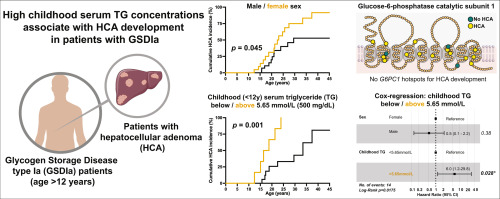
New key Publication: High childhood serum triglyceride concentrations associate with hepatocellular adenoma development in patients with glycogen storage disease type Ia
29 May 2022

Glycogen storage disease type Ia (GSDIa) is an inborn error of carbohydrate metabolism caused by pathogenic variants in the G6PC1 gene, and is associated with hepatocellular adenoma (HCA) formation. Data on risk factors for HCA occurrence in GSDIa are scarce. We investigated HCA development in relation to sex, G6PC1 genotype, and serum triglyceride concentration (TG).
Highlights
- Glycogen storage disease Ia (GSDIa) is a metabolic disease caused by G6PC1 mutation
- GSDIa patients often form hepatocellular adenoma (HCA), with unclear risk factors
- Metabolic control in GSDIa is commonly evaluated through serum triglycerides (TG)
- GSDIa patients with high childhood TG had increased risk and earlier onset of HCA
- Sex-associated hypertriglyceridemia and G6PC1 genotype were not associated with HCA
Authors:
- Martijn P.D. Haring
- Fabian Peeks
- Maaike H. Oosterveer
- Martijn C.G.J. Brouwers
- Carla E.M. Hollak
- Mirian C.H. Janssen
- Janneke G. Langendonk
- Alexander J.M. Rennings
- Margreet A.E.M. Wagenmakers
- Henkjan J. Verkade
- Terry G.J. Derks
- Vincent E. de Meijer
Read more: https://www.jhep-reports.eu/article/S2589-5559(22)00084-2/fulltext
Last modified:21 June 2022 7.01 p.m.
More news
-
15 September 2025
Successful visit to the UG by Rector of Institut Teknologi Bandung
